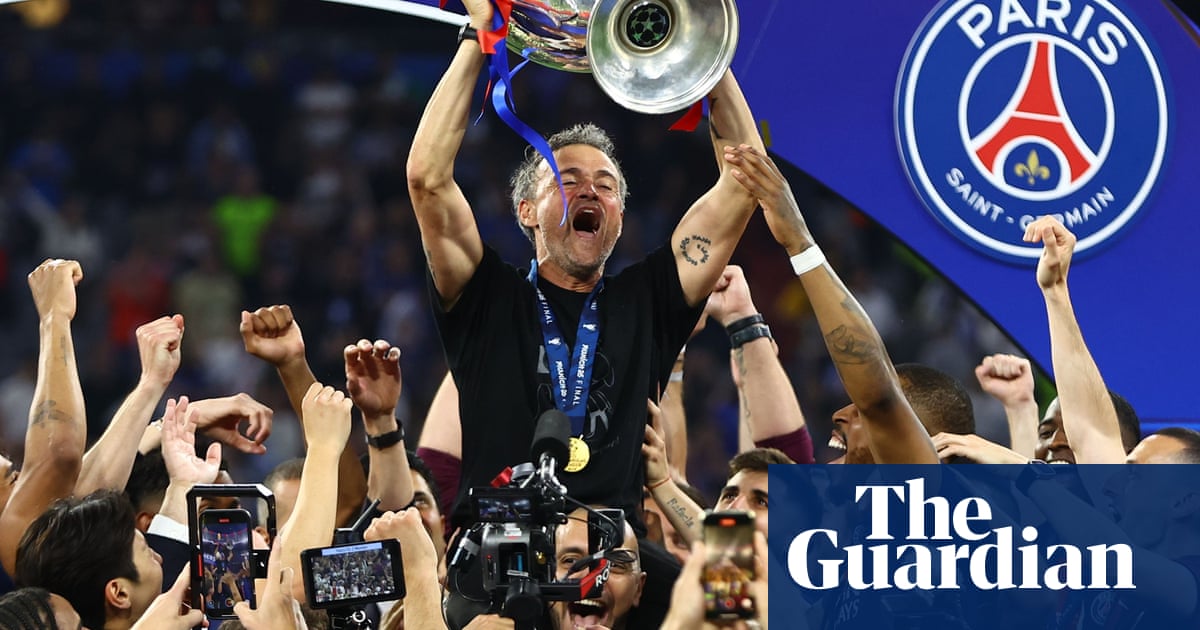At what point did Luis Enrique know it was going to work out, that his Paris Saint‑Germain team would beat Inter at the Allianz Arena to winthe club’s first Champions League title? The manager had certainly cut a cool and confident figure when he emerged on to the pitch about 90 minutes before kick-off for a quick temperature check with his coaches.
The PSG ultras were already behind one of the goals, bobbing up and down en masse. They would be a forceful presence throughout.Luis Enriquewas aware that an omen was on his side. Every time Munich had hosted a final in Europe’s elite competition, a new champion had emerged. Nottingham Forest, 1979. Marseille, 1993. Borussia Dortmund, 1997. And Chelsea, 2012. Inter had arrived as three-time winners.
Luis Enrique is a spiritual person, so maybe that fed into things. What absolutely didwas the shining lighthe had in the sky. “You will be the star that guides our family,” he wrote in tribute to his daughter Xana in 2019 after she died from bone cancer at the age of nine. Luis Enrique carries more than the unimaginable pain. He feels enriched by the time he was able to spend with her.
When the game got under way, everything quickly felt just right for PSG. Luis Enrique had declared his side knew “how to unpick teams like Inter, how to get that tight-knit defence to unravel”. He believed in his approach, how his players would pass and move, especially the bit about the movement – the positional fluidity, the unusual overloads, the aggression in the press, as well. A 2-0 lead after 20 minutes was fortifying.
The way Luis Enrique would tell it, even at 3-0 midway through the second half he wanted a fourth because the game “could still open up” for Inter. So Khvicha Kvaratskhelia’s goal for 4-0 on 73 minutes was probablythemoment for the Spanish coach, although he seemed to really let it all out when Senny Mayulu made it five just before the end.
The 19-year-old substitute, who had been on for only two minutes, was giddy with joy; disbelief even. For Luis Enrique, it was an example of his Midas touch on the night but also a symbol of something wider in terms of what he has built. An unheralded youngster ought not to be able to do this in club football’s biggest game. It is gloriously possible within Luis Enrique’s collective.
Something felt crystal clear as the PSG captain, Marquinhos, emerged through the golden confetti – detonated a little early – to hoist the trophy; Luis Enrique must now be considered among the all-time greats of his profession.
For him, the glory of Munich added up to a second “classic” treble of his career – league,Champions League, principle domestic cup – having achieved the feat at Barcelona in 2014-15. Only one other manager has done this: his former Barcelona and Spain teammate Pep Guardiola, who pulled it off with Barcelona in 2008‑09 and Manchester City in 2022-23. But it has been as much about how Luis Enrique has succeeded at PSG.
Sign up toFootball Daily
Kick off your evenings with the Guardian's take on the world of football
after newsletter promotion
It has sometimes been possible to detect a bit of sniffiness about his exploits at Barcelona. You know, he inherited Lionel Messi and Neymar, with Luis Suárez added for him. Sergio Busquets, Andrés Iniesta and Xavi were already there, too.
It has been different at PSG. With the help of Luís Campos, the recruitment chief, Luis Enrique has created a team – and one in the truest sense. Willian Pacho, João Neves and Désiré Doué were brought in last summer, with Kvaratskhelia, thefinal piece of the puzzle, joining in January.
PSG have spent heavily; it was £200m on that quartet alone. Everything continues to stem from the wealth of the club’s Qatari owners. Yet Luis Enrique has proved his genius by assembling a largely unstarry group who play for the badge rather than themselves; a break, frankly, from previous PSG vintages. And one that is capable of hitting such beautifully sweet high notes, which has a defined and likable identity.
Ousmane Dembélé, who signed in the summer of 2023, which was when Luis Enrique arrived, has scored 33 goals this season. He did not add to the tally against Inter, although he did contribute two assists and was his usual threat. But it was his work without the ball, especially the energy with which he led the press, that had Luis Enrique purring.
“Everyone is talking about the Ballon d’Or … I would give it to Dembélé just for his defensive work against Inter,” the manager said. “He showed what he was made of. He was a leader, he was humble.”
Luis Enrique had noted a few weeks back: “The first year at a club is generally not perfect but in the second you grow more in terms of football and confidence.” He called it, he has felt it, the click coming in January when PSG stormed back from 2-0 downto win 4-2 against Guardiola’s Cityat the Parc des Princes in the penultimate Champions League group phase game.
Since then, they have ridden the wave past everybody, including Liverpool, Aston Villa and Arsenal, all the way to the crowning moment against Inter. And when it was over, there was the tifo from the PSG ultras. It depicted Luis Enrique and Xana in PSG colours planting a flag in the turf, just as they had done with Barcelona after the 2015 Champions League final victory against Juventus. It was overwhelmingly emotional. Xana can be very proud of her dad.
